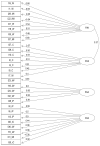An Empirical Test of the Concept of the Adaptively Intelligent Attitude
- PMID: 38786651
- PMCID: PMC11122381
- DOI: 10.3390/jintelligence12050049
An Empirical Test of the Concept of the Adaptively Intelligent Attitude
Abstract
This study provides an empirical test of a previously proposed assertion that intelligence as adaptation has an attitudinal as well as an ability component. The ability component deals with what the basic knowledge and skills are that underlie intelligence, and how much of each one an individual has. The attitudinal component deals with how an individual chooses to deploy the abilities they have. In other words, to what use are the abilities put? It is argued that it is impossible fully to separate the measurement of the ability component from the attitudinal one. In a diverse population, even taking an intelligence test will show itself to involve an attitude toward the test, which may enhance or detract from performance, as when one sees the test as irrelevant or harmful to one's life, or as a sociocultural misfit to one's life experience. To succeed, people need not only to have abilities, but attitudes that put those abilities to effective use to accomplish individuals' life goals. In the study, we found that intelligent attitudes are related, but non-identical, to germane constructs, such as wisdom, the need for cognition, creativity, and openness to experience. Scores on the attitudinal measure were not related to scores on tests of fluid intelligence and academic abilities/achievement. Thus, the range of attitudes regarding how to deploy intelligence can vary over ability levels.
Keywords: adaptation; adaptive intelligence; dispositions; fluid intelligence; intelligence; intelligent attitude.
Conflict of interest statement
The authors declare no conflict of interest.
Figures




References
-
- Abelson Robert P., Aronson Elliot, McGuire William J., Newcomb Theodore M., Rosenberg Milton J., Tannenbaum Percy H., editors. Theories of Cognitive Consistency: A Sourcebook. Rand McNally; Chicago: 1968.
-
- Aczel Balazs. Low levels of wisdom: Foolishness. In: Sternberg Robert J., Glück Judith., editors. Cambridge Handbook of Wisdom. Cambridge University Press; Cambridge: 2020. pp. 483–99.
-
- Altemeyer Robert. The Authoritarian Specter. Harvard University Press; Harvard: 1996.
-
- Ang Soon, Ng Kok Yee, Rockstuhl Thomas. Cultural intelligence. In: Sternberg Robert J., editor. Cambridge Handbook of Intelligence. 2nd ed. Cambridge University Press; Cambridge: 2020. pp. 820–45.
LinkOut - more resources
Full Text Sources

